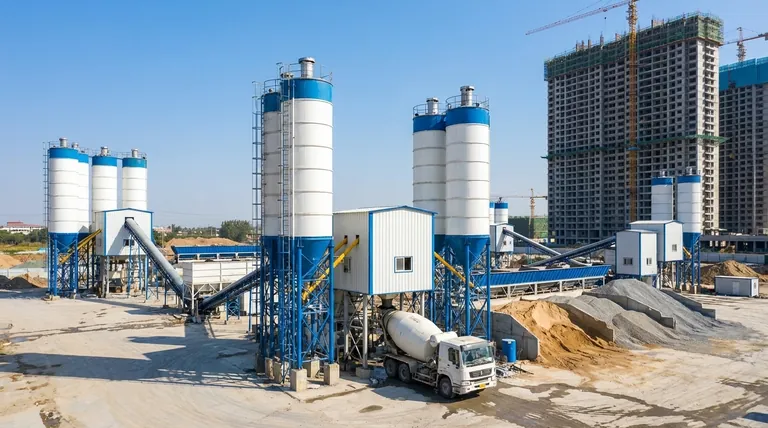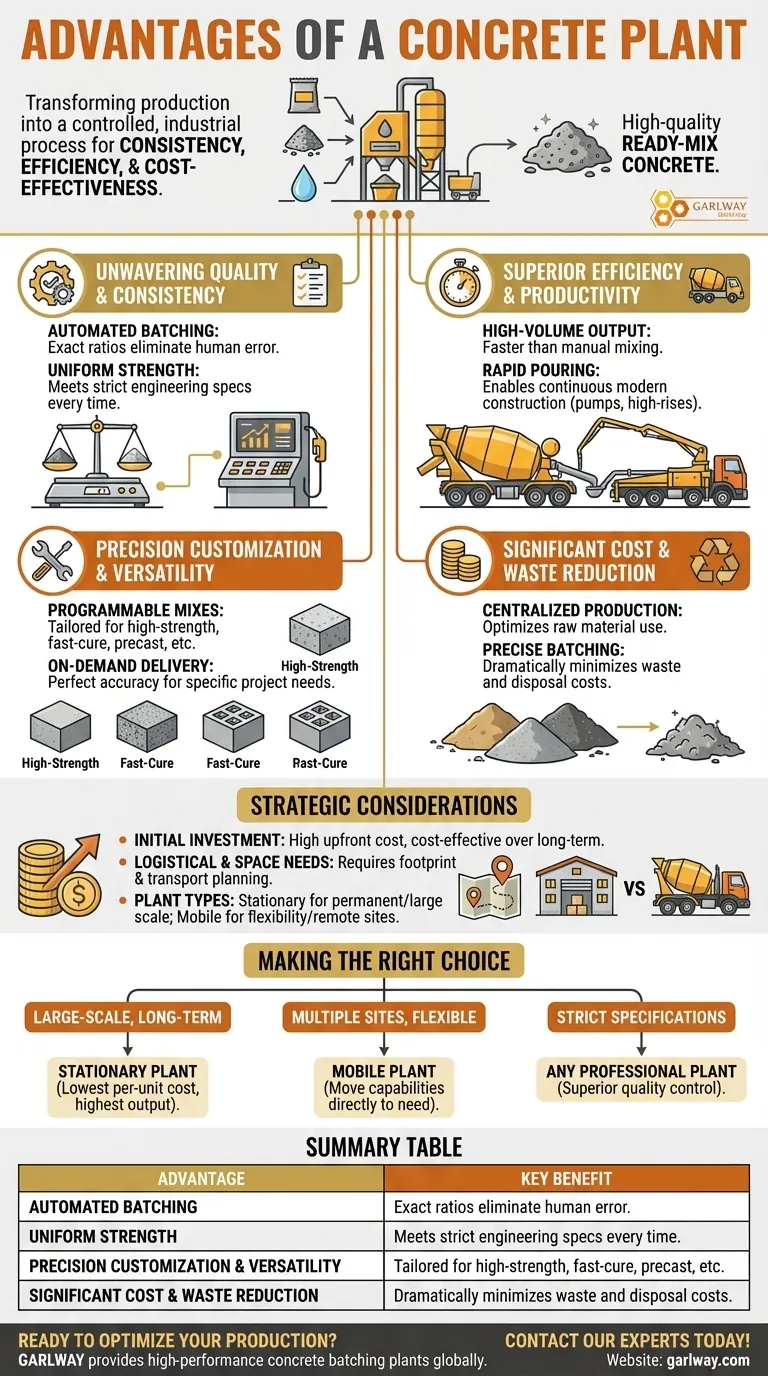In short, the primary advantages of a concrete plant are its ability to produce consistently high-quality concrete at a large scale with significant efficiency. This industrial approach to concrete production replaces the variability of manual mixing with the precision of an automated system, resulting in superior material, reduced waste, and lower long-term costs.
The fundamental advantage of a concrete plant is not merely making concrete, but rather transforming its production into a controlled, industrial process. This shift provides the predictability in quality, cost, and speed that is essential for modern construction.

The Core Advantages of a Concrete Plant
A concrete plant, also known as a batching plant, is an industrial facility that manufactures concrete by precisely combining ingredients. Understanding its benefits reveals why it is a cornerstone of nearly every significant construction project.
Unwavering Quality and Consistency
A plant's automated batching system ensures that every mix has the exact ratio of cement, aggregates, water, and additives.
This precision eliminates the human error and variability common in on-site manual mixing. The result is a uniformly strong and durable concrete that meets strict engineering specifications batch after batch.
Superior Efficiency and Productivity
Concrete plants are designed for high-volume output, producing vast quantities of ready-mix concrete far faster than any manual method.
This high rate of production facilitates modern construction techniques like concrete pumping, enabling the continuous and rapid pouring required for large foundations, high-rise buildings, and infrastructure projects.
Precision Customization and Versatility
Modern plants can be programmed to produce a wide variety of concrete types tailored to specific project needs.
Whether a project requires high-strength concrete for a support column, a fast-curing mix for road repair, or a specific blend for precast elements, the plant can deliver it on demand with perfect accuracy.
Significant Cost and Waste Reduction
By centralizing production, a plant optimizes the use of raw materials. Bulk purchasing lowers ingredient costs, and precise batching dramatically reduces waste.
This efficiency translates directly into cost savings for the project, minimizing material overages and the expense of waste disposal.
Understanding the Trade-offs and Considerations
While the advantages are clear, a concrete plant is an industrial system with its own set of requirements and strategic considerations.
Initial Capital Investment
A stationary concrete plant represents a significant upfront capital investment. Its cost-effectiveness is realized through high-volume, long-term operation.
Logistical and Space Requirements
These facilities require a considerable physical footprint for operation and material storage. Furthermore, the logistics of transporting ready-mix concrete from the plant to the job site before it begins to set is a critical operational challenge.
Stationary vs. Mobile Plants
The type of plant chosen must match the project's scope. Stationary plants are built for permanent installation, serving a specific metropolitan area or a massive, long-term project.
Mobile plants, as their name suggests, are designed to be moved between locations. They are ideal for temporary projects, remote sites, or contractors who serve a wide geographic area with varying production needs.
Making the Right Choice for Your Project
Selecting the right approach to concrete production depends entirely on your project's scale, duration, and specific requirements.
- If your primary focus is large-scale, long-term construction: A stationary central-mix plant offers the lowest per-unit cost and highest output for consistent, high-volume demand.
- If your primary focus is flexibility across multiple job sites: A mobile batching plant provides the versatility to move production capabilities directly where they are needed, reducing transport risks.
- If your primary focus is meeting strict structural specifications: Any professional concrete plant is vastly superior to manual mixing due to its automated quality control and precision.
Ultimately, using a concrete plant is about taking control of your most critical building material.
Summary Table:
| Advantage | Key Benefit |
|---|---|
| Quality & Consistency | Automated batching ensures exact mix ratios for uniform strength and durability. |
| Efficiency & Productivity | High-volume output enables rapid, continuous pouring for large projects. |
| Customization & Versatility | Programmable mixes for high-strength, fast-cure, or specialized concrete types. |
| Cost & Waste Reduction | Bulk purchasing and precise batching lower material costs and minimize waste. |
Ready to take control of your concrete production?
GARLWAY specializes in providing high-performance concrete batching plants for construction companies and contractors globally. Our solutions are engineered to deliver the unwavering quality, superior efficiency, and significant cost savings detailed above.
Whether you need a high-output stationary plant for a long-term project or a versatile mobile plant for multiple sites, we can provide the right equipment to meet your exact specifications.
Contact our experts today to discuss how a GARLWAY concrete plant can optimize your operations and build a stronger foundation for your business.
Visual Guide

Related Products
- HZS180 Ready Mix Concrete Plant for Foundations with Sand and Cement
- HZS75 Concrete Batching Plant Cement Mixer Price Concrete Mixer Bunnings Mixing Plant
- HZS120 Ready Mix Concrete Batching Plant Commercial Mud Cement Mixer
- HZS35 Small Cement Concrete Mixing Batch Plant
- Portable Concrete Mixer Machine Equipment for Mixing Concrete
People Also Ask
- What are the different types of cement plants? A Guide to Wet Mix, Dry Mix, Stationary & Mobile Plants
- How does ready-mix work? A Guide to Efficient, High-Quality Concrete Delivery
- How much does a batching plant cost? Uncover the True Investment for Your Project
- How to make ready mix concrete stronger? Boost Strength with Proven Mixing Techniques
- What are the advantages of ready mix concrete? Higher Quality, Efficiency & Cost Savings
















